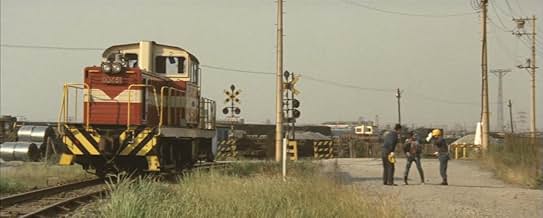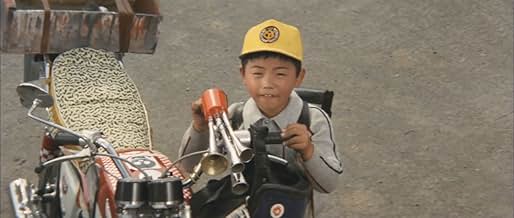A latchkey child living in the industrial city of Kawasaki confronts his loneliness through his escapist dreams of Monster Island and friendship with Minilla.A latchkey child living in the industrial city of Kawasaki confronts his loneliness through his escapist dreams of Monster Island and friendship with Minilla.A latchkey child living in the industrial city of Kawasaki confronts his loneliness through his escapist dreams of Monster Island and friendship with Minilla.
- Awards
- 1 nomination
- Minira
- (Japanese-language version)
- (voice)
- Minira
- (Japanese-language version)
- (voice)
- Gabara
- (uncredited)
- Directors
- Writer
- All cast & crew
- Production, box office & more at IMDbPro
Storyline
Did you know
- TriviaDirector Ishirô Honda intended the movie to have a somber ending, but was forced by Toho to add the more cheerful final sequence in which Ichiro goes to school with the children. When the movie was re-released on home video during the 80s, Honda removed this scene, so the movie ends with Ichiro's mother crying due to not being able to spend more time with her son.
- GoofsA few of the jet aircraft that Godzilla are shown to bounce off his chest. However, an actual jet would be destroyed upon impact. This takes place during a dream sequence, so reality may not be the truth.
- Quotes
Minira: Oh, it's you.
Ichiro Miki: What are you doing?
Minira: Nothing, I have no friends.
Ichiro Miki: Then you're just like me.
Minira: Why did you come back?
Ichiro Miki: You said you'd help me climb up on Godzilla's back.
Minira: Oh, right. I wonder where he is now?
Ichiro Miki: You're not with him all the time?
Minira: No, he gets mad.
Ichiro Miki: Why?
Minira: Godzilla says I have to learn to fight my own battles.
Ichiro Miki: He's tough on you, huh?
- Alternate versionsThe Japanese laserdisc is uncut and fully letterboxed (2:35:1)
- ConnectionsEdited from Kyô mo ware ôzora ni ari (1964)
- SoundtracksKaiju Machi
Performed by Tomonori Yazaki
(Japanese Version Only)
One film is a kid's visit to Monster Island, where he witnesses a compilation of fight scenes from "Son of Godzilla" and "G. Vs. the Sea Monster". Some of this footage looks like out-take or alternate take material; the whole Gabara episode may well have been intended for "Son of" and excised, in the way that "Frankenstein Conquers the World" was to include a fight with a giant squid, some footage of which finding its way into "King Kong Vs. Godzilla".
The second film is a story of a young boy of the working class in an overly-industrialized modern Japan, neglected by his parents, bullied in school, who finds himself kidnapped by a gang of bank robbers and has to learn courage and wit in order to deal with his situation.
The first film is notorious as a "stock-footage" fiasco with a talking monster. The edits only make evident weaknesses in the original material.
The second film is staggeringly depressing. When I first saw this, I wasn't sure how to respond, because certainly I wasn't looking for a grim expose of industrialized Japan. But the first episodes of this storyline, with its backdrop of empty lots and factory smokestacks billowing in the background, add up to a truly unpleasant experience.
Finally, at the center of all this is one of the more annoying child actors of the period. Hard to identify with, and easy to wish away, I feel no sympathy with him at all as an individual, only as representative of the thousands of neglected children like him.
It should be noted that the stock-footage here was filmed by the 'other Godzilla director', Jun Fukuda - so why does Ishiro Honda use it, why not use his own Godzilla material? A real enigma of a film, part overly serious tragicomedy, part self-lacerating rip-off.
Obviously not recommended except for Godzilla completists.
- How long is All Monsters Attack?Powered by Alexa
Details
- Runtime1 hour 10 minutes
- Sound mix
- Aspect ratio
- 2.35 : 1
Contribute to this page

















